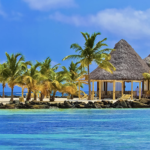What's the Weather Like in Vienna in January
Vienna, the spectacular capital of Austria, is set in central Europe and has a climate to match its continental location. This means that, because of the lack of a large body of water near the city, summers can get hot and winters are cold and snowy. Other nearby central European cities such as Bratislava and Budapest, which are, incidentally, also set on the banks of the mighty Danube River, enjoy the same type of weather .
Temperature
January is the coldest month of the year in Vienna, with January 9th being the coldest day of the year, with a nighttime low temperature of -4°C and daytime highs of no more than 2°C. These numbers, in fact, remain essentially constant throughout the entire month. The overall average temperature in January is -1°C, the same as it was in December. Those are the two months with an average temperature below freezing. February will be a tiny bit warmer, averaging 1°C.
Rainfall
Rainfall varies throughout the year and January happens to be the month with the lowest amount of precipitation: 38mm. Surprisingly, there are 15 days with precipitation, though, which is the highest number of rainy days in any month. The logical conclusion is that precipitation in January is light or moderate and spread out over several days. This is confirmed by the statisticsanuary is one of the months with the highest chance of precipitation, ranging between 61% and 66%. Only in December are you more likely to experience some kind of precipitation.
Snow
Precipitation this time of year falls mainly in the form of snow. Moderate snow is recorded on 40% of the days with precipitation; light snow on 11% of those days. In times when it's slightly warmer, it can also rain. Moderate rain is observed on 30% of the days with precipitation, while light rain falls on 9% of those days. The chance of snowfall is constant throughout the month, ranging around 35% each day.
Sunshine Hours
January, with its 15 days of precipitation, is one of the year's cloudiest months. The average percentage of cloud cover is 86%, which is very high, and doesn't vary all that much. These overcast or mostly cloudy skies result, of course, in limited sunshine. In January, each day has 5 hours of sunshine on average. February has the same number, while December, with only 4 hours, is the least sunny month of the year.
This low number of sunshine hours is also due to the short days in mid-winter. That being said; the length of the days does increase in the course of the month. January 1 is the shortest day with 8.26 daylight hours; January 31 is the longest with 9.26 hours of daylight.
If you're looking for a weather forecast for Vienna, you are advised to visit this page.
Hotels for Vienna in January
Hotel Savoyen
Diplomats and businessmen, as well as regular tourists, will find the Hotel Savoyen to be an ideally located place to stay in January. Situated in the heart of the diplomatic district, but within easy walking distance from the Old Town, this four-star hotel caters to the widest variety of travellers. This is a well-equipped hotel, featuring a business centre, free internet, a wellness area, and two restaurants and a bar.
Hotel Rathauspark
The Hotel Rathauspark is also, just like the hotel above, a part of the Trend Hotel group. This one is located near the Rathaus, or Town Hall in English, and also close to the magnificent Imperial Palace. This excellent four-star accommodation features a Viennese renaissance exterior. Inside, you can enjoy drinks at the bar, meals in the restaurant, the business corner, room service, free internet and free coffee.
Pension Residenz
A cheaper option is Pension Residenz, which is also very centrally located. It lies merely a couple of minutes' walk from the University of Vienna and from the Town Hall. This pension offers traditional Viennese charm and has 23 rooms. Amenities and services include free internet, breakfast and air conditioning.
Restaurants and Bars for Vienna in January
Vienna is not only a cultural and history city; it's also home to some world-class restaurants and a coffee culture that's renowned in Europe, possibly even across the world.
Restaurant Edvard
One of the greatest gourmet restaurants in Vienna is Restaurant Edvard, run by a Michelin-starred chef, Anton Pozeg. This restaurant is housed at Palais Hansen Kempinski. The dishes served there are Mediterranean-inspired and made with the freshest possible seasonal ingredients. Its signature dishes are made with only a few of those ingredients, proving that it's possible to create world-class food without overdoing it.
Fabios
Another classy restaurant is Fabios, a modern and trendy dining establishment that focuses on Italian cuisine and has amazing service. Its prices are above average, though, but if you can splurge on a meal during your vacation, you might find yourself dining next to a celebrity at this superb restaurant.
Things to Do in Vienna in January
Even though January may be one of the coldest months of the year in Vienna, there still are plenty of things to do in this historic city filled with museums, palaces, music halls and opera buildings. In fact, there's so much to do that you will most likely have to make some choicesven the number of museums alone is so high that it's impossible to visit them all in the timespan of the average vacation.
Museum of Fine Arts
One museum that should by no means be skipped, however, is the phenomenal Museum of Fine Arts. Home to one of the absolute greatest collections of art in the entire world, this museum showcases numerous paintings by the Old Masters that were acquired by the once wealthy and powerful Habsburg Family. It exhibits works by world-famous painters such as Vermeer, Rembrandt, Rubens, Velazquez, Dürer and Raphael, but its greatest treasure is its vast collection of paintings by Pieter Brueghel the Elderhe largest in the world, in fact.
Additionally, the Museum of Fine Arts, or Kunsthistorisches Museum in German, also boasts collections of ancient Greek and Roman sculptures, medieval works of art and Egyptian art. It's a magnificent museum that can be considered to be of the same quality as, say, the Louvre in Paris and the Prado in Madrid.


























